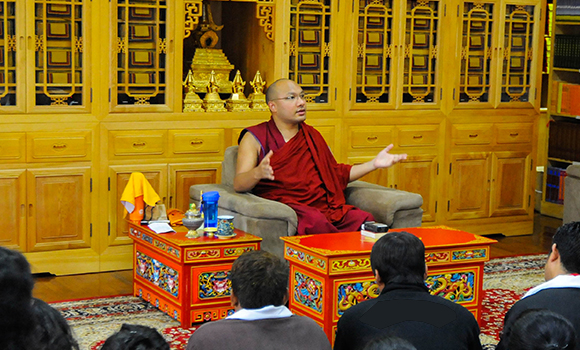
September 29, 2016 – Sidhbari, HP, India.
Today His Holiness The Gyalwang Karmapa met with young leaders, ages 22 to 30, from the Spiritual Ecology Youth Fellowship in the United States. They had been chosen for their potential as catalysts for practical change, centered in a spiritual world with sensitivity for the nature. These young people seek to create a future that is not driven by materialism and greed, but rooted in the spiritual values of interconnectedness, service, stewardship, and reverence for nature.
Their first question for His Holiness was asked by a young woman who had gone in a bicycle pilgrimage in several counties, including the US, Canada, and Iceland. She posed to His Holiness the key question that she had asked on her travels: When and how did you first become passionate about environmental issues?
The Karmapa responded by returning to his childhood to identify the source of his connection to the environment. Noting that he had grown up in a remote area of Eastern Tibet, he recalled, “We lived a traditional life style that was close to the natural environment. This is the source of my experience, which makes it easy to recognize how important the environment is.”
He also spoke of the conferences and workshops his environmental organization, Khoryuk, had conducted for nuns and monks, who have the motivation to help, but sometimes do not know how. These seminars give them practical knowledge on what to do and how to manage projects that will help to preserve the environment.
The next question came from a woman whose family had experienced the trauma of the bombing in the Marshall Islands. She wondered about how people in the future will deal with the trauma caused by climate change.
The Karmapa responded, “I think they will need a simple meditation practice. In places like my home in Tibet, people are living a very simple life, which sometimes brings physical hardships but mentally it’s healthy and powerful.” In the world these days, he remarked, many people spend their time focused on the material world, so their inner strength, which allows them to face difficulties, decreases. He suggested, “After a disaster, we could provide a meditation program or psychological support to help people overcome this kind of trauma.”
A young man then asked about China, saying that he had a strong sense that there is an ecological and spiritual awakening occurring in the younger generation. Could His Holiness speak about this?
The Karmapa replied that China has rich cultural and spiritual traditions, but in recent history they have spent time improving their material situation. People were focused on becoming wealthy but internally felt quite empty and lonely. These days people recognize the problem, so increasing numbers of people want to learn about something that goes beyond the world of material wealth. They are searching for internal wealth, which brings true happiness.
Being engaged in environmental protection, he remarked, can bring a connection with spiritual practice. We can feel the interdependent relationship between ourselves and the environment and other living beings. This enables us to recognize a wider sense of who we are. Usually, he explained, “We have a strange idea about ‘me’ and ‘mine’ thinking they are independent and solid. But actually everything is interconnected. Without other species, we cannot survive. That is why I think practical engagement in environmental activity can develop our inner strength.”
The last question asked if there were anything they could share with the nunnery they were soon going to visit.
The Karmapa responded, “Each and every one of you have amazing and special experiences. If you can share these with the nuns, they will be inspired. Sometimes if you’re only talking about science with lots of numbers and information, it’s not enough to move people. Sharing your own experience is the most valuable thing you can give to the nuns.”
With this encouragement to connect on a personal level, the Karmapa’s lively meeting these future leaders came to a close.


